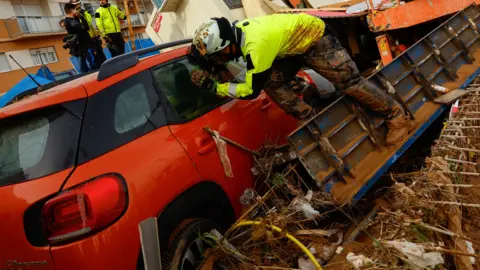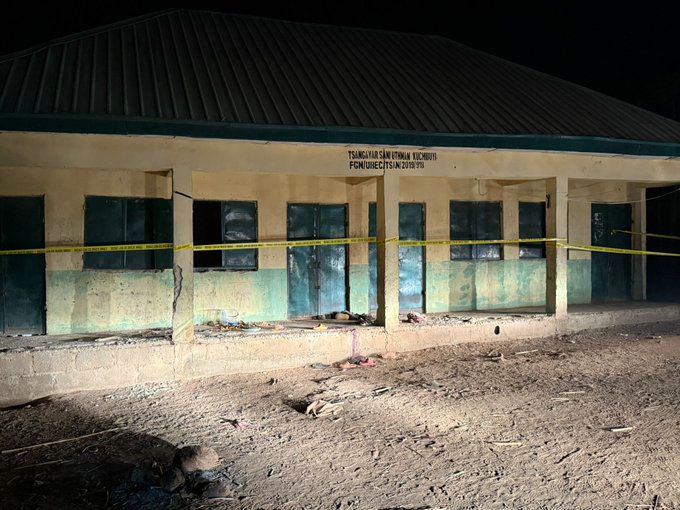Watch first wave of flood water gushing through town in Valencia
Emergency teams in Spain are continuing their efforts to locate dozens of people still missing in what is the worst flooding disaster in generations.
More than 200 people are known to have died, with most fatalities happening in the Valencia region, but the death toll is expected to rise.
The floods destroyed bridges and covered towns with mud - leaving cut-off communities without water, food or electricity.
Some residents say more lives could have been saved if the local authorities had been quicker to warn of the flood risk.
Among them is Juan González, who lives in the town of Aldaia in Valencia. He told the BBC that the loss there was devastating.
“This is an area prone to flash flooding. It's outrageous that our local government didn't do anything about it, knowing that this was coming, and they did nothing about it," he said.
Another local, Augustin, said the flat where he lived with his wife and children had been completely flooded and they have had to move in with his parents.
The civil protection agency, overseen by the regional government, issued an emergency alert to the phones of people in and around the city of Valencia after 20:00 local time (19:00 GMT) on Tuesday, by which time the flood water was swiftly rising in many areas and in some cases already wreaking havoc.
Questions remain about the timing of the alert and whether Spain has an adequate warning system for natural disasters.
Mireia, who lives close to some of the devastation in Valencia, said that people were "not prepared at all".
"Many people were inside their cars, they couldn’t make it out," she said. "They were just drowned by the water."
Thousands of volunteers are currently helping the Spanish military and emergency services with the rescue and clean-up operation, and Valencia's regional president, Carlos Mazon, said more troops would be deployed.
Spain's Prime Minister Pedro Sanchez took to social media to express his thanks to volunteers, calling them an "example of solidarity and the limitless dedication of Spanish society".
He has vowed that his government will do whatever it takes to help those affected by the disaster.
In the devastated town of Paiporta, where more than 60 deaths have so far been reported, residents have expressed their frustration that aid is coming in too slowly.
"There aren't enough firefighters, the shovels haven't arrived," Paco Clemente, a 33-year-old pharmacist, told the AFP news agency as he helped clear mud from a friend's house.
Dozens of people have been arrested for looting, with one Aldaia resident telling AFP he saw thieves grabbing items from an abandoned supermarket as "people are a bit desperate".

 Reuters
Reuters
It is feared that more people will be found dead in their cars, after some motorists were trapped by the floodwaters
Meanwhile, the Spanish authorities have extended a red alert for torrential rain on the southern coast.
It includes the Huelva region, which has already been badly hit by downpours. The city of Cartaya saw around two months' worth of rain in just 10 hours.
There are warnings of further heavy downfalls into Saturday.
One of the contributing factors to the disaster was a lack of rainfall throughout the rest of the year, which left the ground in many areas of eastern and southern Spain unable to absorb rainwater efficiently.
The warming climate is also likely to have contributed to the severity of the floods.
In a preliminary report, World Weather Attribution (WWA), a group of international scientists who investigate global warming’s role in extreme weather, found that the rainfall which struck Spain was 12% heavier due to climate change and that the weather event experienced was twice as likely.

 2 months ago
35
2 months ago
35















 English (US) ·
English (US) ·